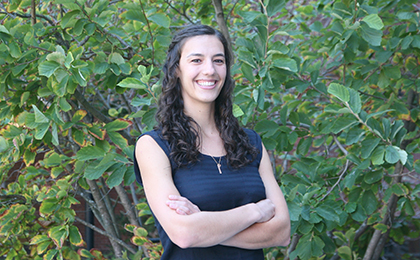Third-year MCO student Catherine Weiner of the Rinn Lab in SCRB was doubly lauded this spring when she earned a National Science Foundation Graduate Research Fellowship (NSF-GRF) and a Landry Cancer Biology Research Fellowship from Harvard.
“The NSF fellowship is one of the highest form of recognition for graduate students,” said Professor John Rinn. “Katie not only was awarded this prestigious fellowship, but also the Laundry fellowship, something our lab has never been awarded.”
Weiner’s work supports the Rinn Lab’s research on DNA architecture, including the inter-chromosomal interactions in long non-coding RNA (lncRNA).
“I have always been curious as to how life works at the molecular level,” Weiner said. “During my diverse undergraduate research experience, I uncovered a strong interest in the non-coding genome. This interest lead me to pursue my graduate thesis in the lab of Dr. John Rinn, where I am currently working to understand the role of noncoding genetic loci on the three-dimensional folding of the genome using live-cell imaging and other molecular biology techniques.”
“My project aims to characterize, for the first time, the fundamental spatial and temporal properties underlying the formation of inter-chromosomal domains using live cell imaging,” Weiner said. “Specifically, I aim to determine the frequency, stability, and distances of inter-chromosomal interactions. This can be accomplished through a live-cell imaging method we have recently developed in collaboration with HCBI termed CRISPR-display Live-cell Imaging (CLING).”
NSF Fellowships are awarded to about 2,000 U.S. students every year, who are offered a three-year stipend and $12,000 towards tuition. The Harvard Landry Cancer Biology Consortium awards two-year fellowships to five second-year GSAS Ph.D students per year, who are given discretionary funds for attending conferences on cancer biology along with tuition support and a stipend.
“Katie more than deserves these accolades, but for our lab the real reward is Katie’s contributions to teaching, lab environment and razor sharp smarts in the lab,” said Professor Rinn. “Her trajectory is simply prodigious and our lab could not be more proud and happy for all of Katie’s accomplishments!”


